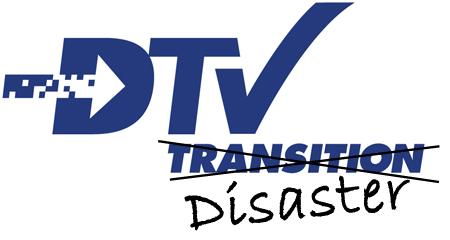
Since digital TV broadcasting began back in the late 1990s, the path to analog's inevitable extinction has been a long and rocky one. Did I say inevitable? Perhaps the word "impossible" may be more accurate.
After several delays in the announced date for the end of analog broadcasting, Congress eventually settled on February 17th, 2009 as the "firm" deadline for turning off analog broadcasts in the United States. Now, about 12 days before that date, Congress has passed a bill to delay the DTV transition yet again, this time to June 12, 2009.
The problem, though, is Congress has gone soft on the date, meaning that broadcasters are now allowed to transition to all digital broadcasts anytime they choose between now and June 12th. It is believed this new "phased" approach be better for those not prepared for the DTV switch, since some, if not all of their analog stations will be available for another four months. However, I believe this will inevitably cause greater consumer confusion and, most likely, additional delays in the future.
I'm not saying I don't feel for the roughly 6.5 million unprepared individuals across this country, and I also will admit that some small percentage of that number may not be able to afford a DTV converter box should their analog signals go away.
The reality, and the reasons I'm annoyed by this "so-called" delay, is:
- The fact the government, networks, and countless others have spent years announcing when analog signals will go away, what will happen to their TV sets, and what they need to do to continue watching TV. The transition to digital TV (television of all things) has cost an enormous amount of money for taxpayers and broadcasters, and just when we were on the eve to putting it behind us, we have to spend an additional billion (don't believe 650 million... it's going to cost far more than that in the end) dollars so the 6.5 million who are already unprepared can do nothing for another four months.
- There are many who claim they are "waiting for coupons" to get their subsidized DTV converter box. What I find interesting is that the TV they bought wasn't subsidized by the government, and the government doesn't pay to upgrade my PC when it becomes obsolete. Many of these people somehow, some way, managed to scrape together enough coin to buy a TV. I believe the majority of them will be able to come up with a one-time payment of $40 to buy a converter.
- This new plan if far more confusing for the consumer. In the past the message had been "You better get a converter by February 17th or your TV won't work anymore." Now this message looks like, "You might want to consider getting a box soon because the TV network in your area could possibly turn off their analog broadcasts sometime by June 12th. All the stations in your area will do it at different times, but they may all do it June 12th."
- The vast majority of public service announcements I've seen ask the viewer to find out more at dtv2009.gov. How many low-income seniors really have web access... or even a PC?
- The government coupon program should never have given two boxes per household. One for their primary TV would have been enough to ensure they were not completely without TV, leaving it up to them to purchase or acquire additional converter boxes on their own over time.
So why will this delay not accomplish anything? Great question! Here's why:
- Those who have not taken action to prepare for digital TV will now be less likely to do so. Many will believe they must be already prepared since their TV set is still working.
- The government has proven that as long as people continue to do nothing about the impending switch, they will continue to extend the transition date. In other words, the warnings for June 12th will mean jack.
- Many just won't worry about it until they have to, and will only take action when forced to. Those who can afford a low-cost DTV converter (and I would assume that's a pretty good number of them) would be watching TV again after a quick trip to the local Wal-Mart. Just like grocery shopping, you don't buy milk for next month today.
- Without a hard date, local markets could end up with half their stations switched. While this may entice some to go get a converter, those not in the know may get confused and assume something is wrong with their TV. Really... why would only half the stations come in?
- Many just won't buy a converter until they get a coupon, or they're forced to. The slow moving coupon program is also to blame for this. Four months just isn't enough time to get a significant number of coupons in the hands of consumers in time for them to use it.
Here's hoping the broadcasters out there join together and finally put an end to analog broadcasting themselves and all turn off on February 17th as planned.





Comments
The delay is crazy. No one
The delay is crazy. No one that is ready now will be ready then. Now they need to create new ads that tell about the delay and then more that talk about the deadline. Not to mention some providers have already reduced their bandwidth strength on their analog channels.
The delay will just cost the government (us) more money.